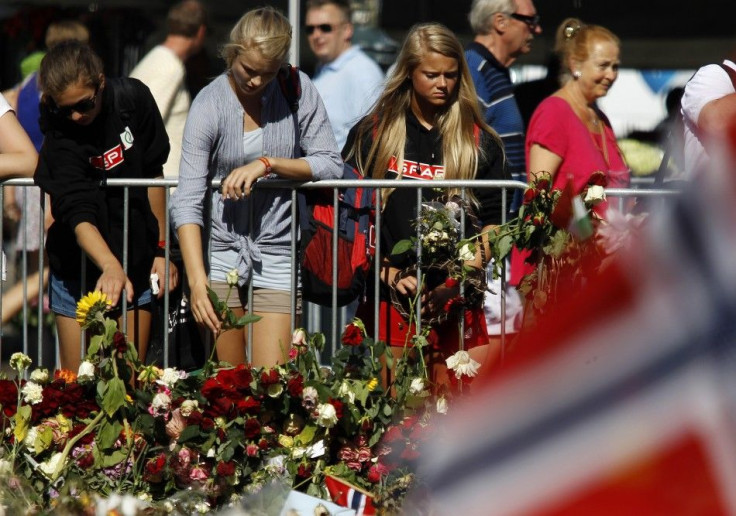One Year After Breivik: Norway Refuses To Live In Fear
ANALYSIS

On Sunday, Norwegians gathered together in churches and town centers across the country to commemorate the victims of the nation's worst peacetime atrocity.
One year earlier, extreme-right-wing terrorist Anders Behring Breivik had killed 77 people. On July 22, 2011, he detonated a car bomb outside of a government building in Oslo, then went on a shooting spree at a summer camp on Utoeya island, killing 69 people, most of them teenagers.
Calling himself a crusader in the Norwegian resistance movement, Breivik said in court and in a 1,500-page manifesto that his acts of terrorism were done while in combat against multi-culturalism and Islamification, which he believes are destroying Norwegian society.
A year later, in response, Norway's prime minister, Jens Stoltenberg, said at a wreath-laying ceremony in the capital that the Norwegian people answered [Breivik] by embracing our values. As promised in a speech 12 months earlier, he believes that the country succeeded in responding to the tragedy with more democracy, more openness and greater political participation.
Norway also responded with a debate on gun control. Like the recent shooting in a movie theater in Aurora, Colorado, which occurred just two days before the Oslo anniversary, the massacre not only made Norway look deeply into its soul, but also into its legislation.
Norway has significantly stricter gun control laws than the United States in general and Colorado in particular but, as Senator John McCain told CNN this weekend, those laws didn't stop Breivik from obtaining weapons and bomb-making material. On Sunday, the UK's Independent argued in its Leading Article section that gun control only touches the surface on a problem with much deeper roots:
It is unrealistic to expect the US to Europeanize its gun laws -- it has resisted many opportunities to do so -- nor, as Breivik's crime shows, would it necessarily prevent future atrocities. The demons that drive mass killers are about more than the availability of guns.
Regardless of that central debate, there have been few, if any, tangible changes to Norway's legislature. The national penal system was briefly called into question -- the killer is still in the spotlight inside a courthouse while judges rule whether he was sane at the time of the attacks -- but that debate has waned.
Sane or insane, Norwegians just want Breivik put away for life, which now seems inevitable.
Norwegians haven't let the massacre challenge the foundations of their society. Indeed, the liberalism and freedoms on which the nation prides itself and that Breivik loathed, has been granted to the killer as he stands trial. Additionally, Norway's police have apologized for their slow response to the massacre on Utoeya, but, like before the tragedy, there are still few officers patrolling cities. Norway is determined not to live in fear.
Likewise, according to the Independent, Norwegians have tried to paint Breivik's motives as the singular views of a madman. The consequences of this attitude have yet to be seen, but one year later, moving past tragedy may be exactly what Norway needs.
© Copyright IBTimes 2024. All rights reserved.





















